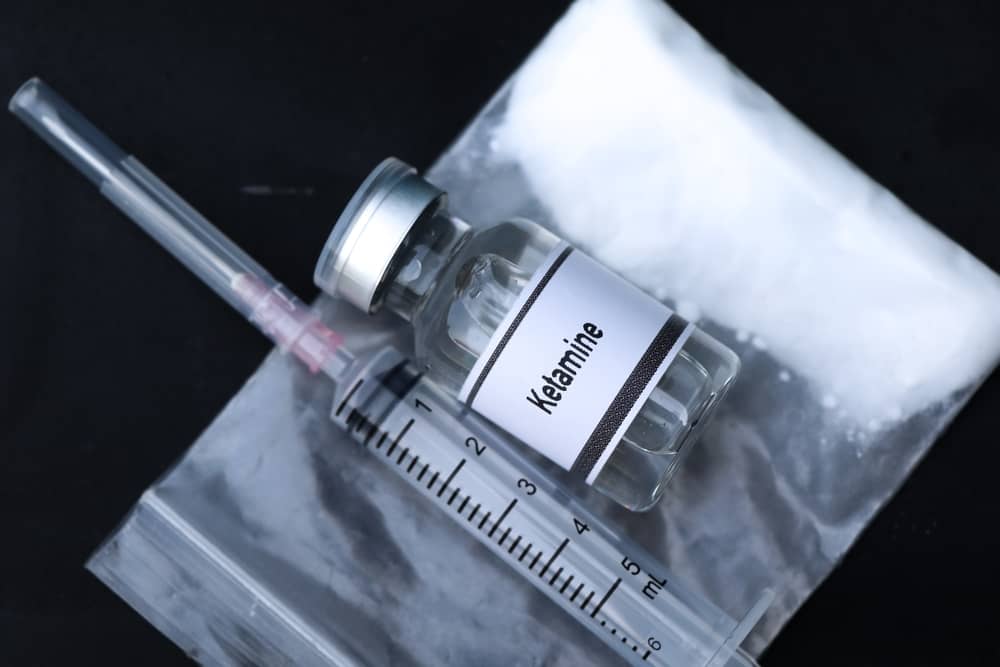Ketamine is used as a tranquilizer for horses. It is widely used for this purpose due to its sedative effects.
Ketamine is commonly known as a horse tranquilizer because it is frequently used as a sedative for horses during surgeries or medical procedures. However, it is also used as an anesthetic for humans and animals. Ketamine blocks certain nerve pathways in the brain, resulting in a dissociative state where patients feel detached from their surroundings.
This dissociative effect makes it an effective tranquilizer for horses, keeping them calm and relaxed during procedures. However, ketamine should only be used under the supervision of a veterinarian, as it can have both positive and negative effects on the animal’s health.
What Is Ketamine?
Ketamine is a powerful anesthetic drug that is commonly used in both humans and animals. It was first developed in the 1960s as an alternative to phencyclidine (PCP), a drug with hallucinogenic effects. Ketamine is classified as a dissociative anesthetic, meaning it can induce a state of sedation and relaxation while also causing a feeling of detachment from the environment.
Origin And Chemical Structure
Ketamine was created for medical use and gained popularity as a human anesthetic due to its rapid onset of action and minimal respiratory depression. It is chemically related to phencyclidine and shares many of its pharmacological properties. Ketamine comprises carbon, hydrogen, nitrogen, and oxygen atoms arranged in a specific structure.
Medical And Therapeutic Uses
Ketamine has a wide range of medical and therapeutic uses. It is commonly used in surgical procedures, particularly in emergencies or for patients who cannot tolerate other anesthetic agents. Additionally, ketamine has gained attention for its potential in the treatment of various mental health conditions, such as depression, post-traumatic stress disorder (PTSD), and chronic pain. Research has shown that ketamine can have rapid and profound effects on these conditions, providing relief when other treatments have failed.
Misconceptions Regarding Its Use
Despite its proven effectiveness, there are some misconceptions surrounding ketamine. One of the most common misconceptions is that ketamine is solely a horse tranquilizer. While it is used in veterinary medicine, it is important to note that ketamine has a long history of safe and effective use in humans as well. Additionally, ketamine is sometimes associated with recreational use and abuse. However, when used under medical supervision, ketamine is a valuable tool for anesthesia and mental health treatment.
Is Ketamine A Horse Tranquilizer?: Debunking The Myths
Is Ketamine a Horse Tranquilizer? There is a common misconception that Ketamine is solely used as a tranquilizer for horses. However, the reality is quite different: Ketamine was first developed as a veterinary anesthetic in the 1960s. Its ability to induce sedation and provide pain relief in animals quickly made it a popular choice for veterinarians.
Over time, the medical community recognized the potential of Ketamine for humans as well. Today, it is widely used as an anesthetic in humans and animals. While it is true that Ketamine is still used in veterinary medicine, it has far surpassed its original designation as a “horse tranquilizer.”
The history of Ketamine in veterinary medicine highlights its potential and versatility in managing pain and sedation. Ketamine is crucial in human and animal healthcare, offering safe and effective anesthesia and analgesia options. By comparing the veterinary and human clinical applications of Ketamine, we can debunk the misleading notion that it is only a horse tranquilizer. This stereotype fails to acknowledge the depth and breadth of Ketamine’s impact on modern anesthesia practice and patient care.
Medical Versus Recreational Use
Ketamine is a medication mainly used for medical purposes as an anesthetic and pain relief. Its powerful sedative effects make it effective in surgeries and emergencies. Additionally, ketamine has shown potential benefits in treating mental health disorders. Studies have indicated that it can be a promising treatment for conditions like depression, anxiety, and post-traumatic stress disorder.
However, in recent years, there has been a rise in its recreational use. Due to its dissociative and hallucinogenic effects, some individuals misuse ketamine for its mind-altering properties. This has led to concerns regarding the associated risks, such as addiction, cognitive impairment, and harmful physical side effects. It is essential to understand the distinction between the safe and supervised medical use of ketamine and its non-medical, recreational use.
Unveiling The Truth About Ketamine Dosage
Appropriate Dosages For Human Versus Animal Treatment
Ketamine is commonly known as a horse tranquilizer, but its uses extend far beyond veterinary practices. It is a powerful anesthetic and analgesic for humans and animals when administered appropriately. However, the dosage requirements differ significantly.
For humans, ketamine dosage depends on various factors, including the purpose of administration and the patient’s age, weight, and medical condition. Typical doses for anesthesia range between 1- 4.5 mg per kilogram of body weight. Low-dose treatments for depression tend to be around 0.5 mg/kg. Medical professionals must carefully calculate and administer the appropriate human dosage, considering the potential for side effects.
When it comes to animals, ketamine is utilized as a sedative and anesthetic. The dosages depend on the species, size, and intended effect. For example, horses may require 2-3 mg/kg, while dogs might need 5-10 mg/kg. The veterinarian determines the dosage based on the specific circumstances and closely monitors the animal’s response to prevent adverse reactions.
Safety Protocols And Control Measures
Regardless of the recipient, administering ketamine requires strict adherence to safety protocols and control measures. Medical professionals and veterinarians are responsible for understanding the drug’s properties, potential risks, and appropriate dosage calculations. These individuals should possess the necessary training and experience to administer ketamine safely and responsibly.
Furthermore, following established guidelines and regulations in healthcare and veterinary settings is crucial to minimize the likelihood of dosage errors or other mishaps. This includes accurate record-keeping, sterile technique adherence, and disposal of containers and materials used during ketamine administration.
Consequences Of Improper Dosage
Administering ketamine in improper dosages can have severe consequences. For humans, overdosing or underdosing may lead to complications such as respiratory depression, hallucinations, cardiovascular issues, or even coma. Similar risks exist in animals, where an inaccurate dosage can result in adverse reactions, impaired recovery, or even death.
It is essential to consult trained professionals who are knowledgeable in the appropriate usage and administration of ketamine. They possess the expertise required to calculate precise dosages based on individual needs, whether human or animal and ensure safe and effective treatment.
Regulatory Landscape For Ketamine
FDA Approval and Controlled Substance Classification
Ketamine, commonly known as a horse tranquilizer, has a regulated legal status around the world. The FDA has indeed approved ketamine for various medical purposes, such as anesthesia and pain management. However, it is important to note that ketamine is classified as a controlled substance due to its potential for misuse and abuse.
When it comes to the global legal status of ketamine, it varies from country to country. In some places, it is classified as a restricted drug and tightly regulated, limiting its availability to medical professionals only. Such regulations were implemented to prevent unauthorized use and ensure appropriate use in medical settings.
This legislation has had a significant impact on the usage and research of ketamine. Its controlled status has restricted its non-medical use, deterring potential misuse. On the other hand, it has also presented challenges for scientists and researchers to conduct further studies on its potential therapeutic benefits.
Clearing The Confusion: Human And Veterinary Differences
The Veterinary Formulations versus Human Formulations: Ketamine is widely known as a horse tranquilizer, but it is a powerful anesthetic used in both human and veterinary medicine. However, the formulations and dosages used in veterinary medicine can differ from those used in humans. Veterinarians use specialized formulations tailored to suit animals’ unique physiological characteristics and requirements.
Effect on Different Species and Why it Matters: Ketamine affects various species differently due to variations in metabolic rate, body composition, and sensitivity to the drug. Medical professionals must understand these differences to provide appropriate and effective treatment for animals. Recognizing the diverse effects of ketamine on different species enables veterinarians to ensure the safety and well-being of their patients.
How Medical Professionals Dispel Common Myths: Medical professionals play a vital role in dispelling ketamine misconceptions. By educating the public about the safe and responsible use of ketamine in both human and veterinary medicine, they help break down stigmas and promote accurate understanding. This enables individuals to make informed decisions about the appropriate use of ketamine for their specific needs.
Ketamine In Popular Culture
Contrary to popular belief, Ketamine is not solely a horse tranquilizer. While it is indeed used as an anesthetic in veterinary medicine, it also has legitimate applications in human medicine. Ketamine’s versatility extends to its use as a sedation, analgesia, and anesthesia medication in hospitals and clinics. This anesthetic dissociates the brain’s cortex, inducing a disconnection between the body and the mind.
Unfortunately, media portrayals often simplify Ketamine’s purpose, reinforcing the misconception that it is solely a horse tranquilizer. Pop culture plays a significant role in shaping public perception, and inaccurate information can perpetuate stereotypes. However, it is essential to debunk myths surrounding Ketamine through accurate information dissemination. By highlighting its diverse applications, including mental health treatments such as depression and post-traumatic stress disorder, we can challenge the prevailing misconceptions.
| Influence of media portrayal on public perception | |
|---|---|
| Positive Aspects | Negative Aspects |
|
|
|
|

Credit: blog.wondermed.com
Advancements In Ketamine Research
Advancements in Ketamine research have generated significant interest in its potential applications beyond its traditional use as a horse tranquilizer. Recent studies and clinical trials have revealed promising breakthroughs in the treatment of psychiatric disorders, including depression and post-traumatic stress disorder (PTSD). Ketamine’s ability to rapidly alleviate symptoms and its antidepressant effects have captured the attention of researchers and clinicians alike.
Looking forward, the prospects for Ketamine in medicine are promising. Ongoing research aims to explore its potential in other mental health disorders, such as anxiety and bipolar disorder. Moreover, innovative delivery methods, such as nasal sprays and tablets, are being developed to enhance the accessibility and convenience of Ketamine treatment.
Ketamine has shown great promise in revolutionizing psychiatric treatments. Its unique mechanism of action and efficacy in treating various mental health conditions make it a potential game-changer in medicine.
Safe Practices And Awareness
Is Ketamine a Horse Tranquilizer? Many people associate Ketamine primarily as a horse tranquilizer, but it is also used medically in humans. Education on the safe medical use of Ketamine is crucial in addressing the stigma associated with its use. Individuals need to have access to reliable resources and support when seeking treatment with Ketamine.
Frequently Asked Question
Is Ketamine A Horse Tranquilizer?
Ketamine is commonly used as a tranquilizer for horses. However, it also has a wide range of medical uses in humans. It is an anesthetic, analgesic, and an antidepressant. While it may have veterinary applications, its potential benefits in human medicine should not be overlooked.
Conclusion
To conclude, Ketamine does have a history of being used as a tranquilizer for horses. However, it is important to understand that it also has extensive medical and therapeutic applications for humans. While it is classified as a Schedule III controlled substance, Ketamine is undergoing scientific research and is being administered in controlled settings for treating depression, anxiety, and chronic pain.
It is imperative to seek professional medical advice and adhere to prescribed dosages. Trust in the expertise of healthcare professionals to determine the best course of action regarding Ketamine use.

